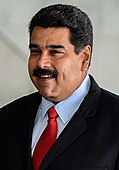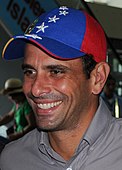Venezuelan presidential election, 2013
|
|
|||||||||||||||||||||||||
|---|---|---|---|---|---|---|---|---|---|---|---|---|---|---|---|---|---|---|---|---|---|---|---|---|---|
|
|||||||||||||||||||||||||
| Turnout | 79.68% | ||||||||||||||||||||||||
|
|||||||||||||||||||||||||

Presidential election results map. Red denotes states won by Maduro, Blue denotes those won by Capriles.
|
|||||||||||||||||||||||||
|
|||||||||||||||||||||||||
A presidential election was held in Venezuela on 14 April 2013 following the death of President Hugo Chávez on 5 March 2013. Voters gave Nicolás Maduro—who had assumed the role of acting president since Chávez's death—a narrow victory over his opponent Henrique Capriles Radonski, the Governor of Miranda. Capriles had run in the previous election less than a year before, losing to Chávez by an 11-point margin. This time the margin of victory was much smaller (being 1.49%), and thus became the closest Presidential Election of the country since the 1968 election.
Capriles refused to accept the results of the election, claiming election irregularities, despite the electoral council's post-election audit of a random selection of 54% of votes, comparing the electronic records with the paper ballots, which showed no problems. Capriles initially called for an audit of the remaining 46% of votes, asserting that this would show that he had won the election. The election council agreed to carry out an audit, and planned to do so in May. Later Capriles changed his mind, adding demands for a full audit of the electoral registry (with validation of all fingerprints and signatures in the records), and calling the audit process "a joke" when the election council declared this "impossible" on the grounds that it would take "years". On 12 June 2013 the results of the audit were announced. The National Electoral Council (CNE) had found no discrepancy with the initial results and confirmed Maduro's electoral victory.
...
Wikipedia


